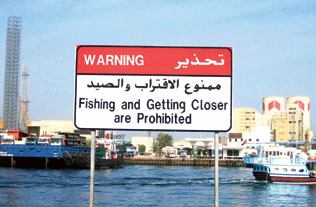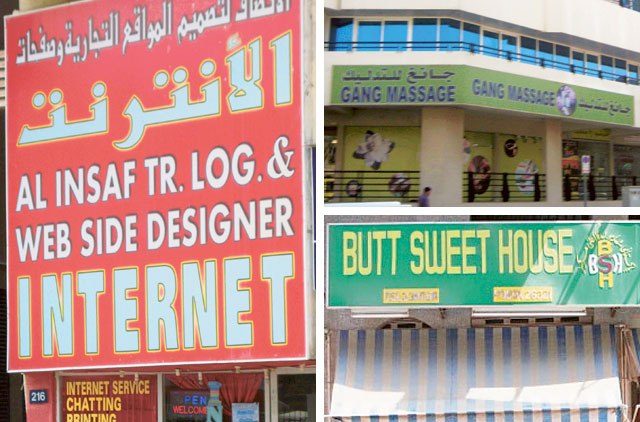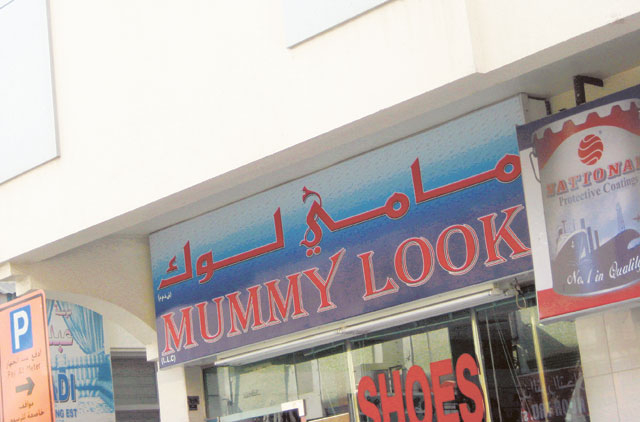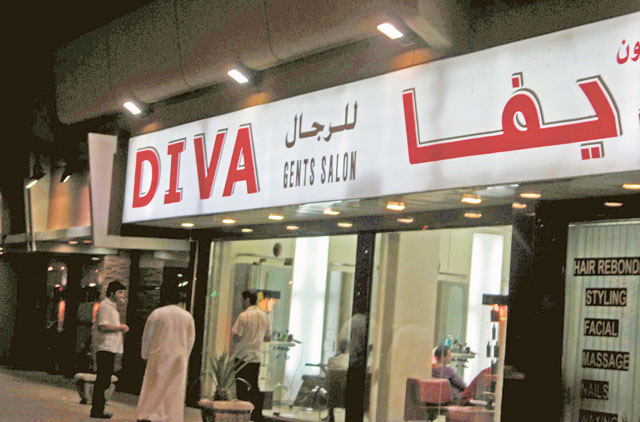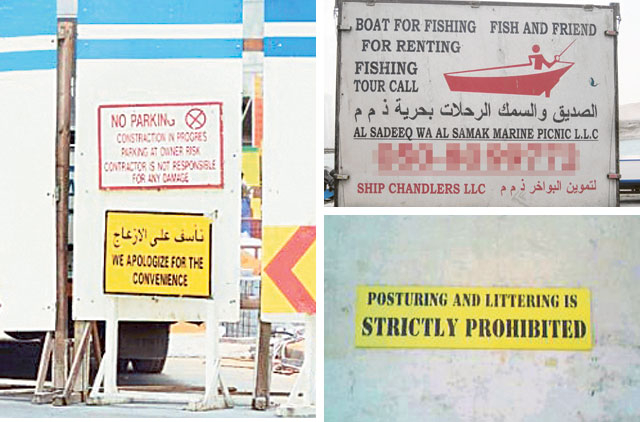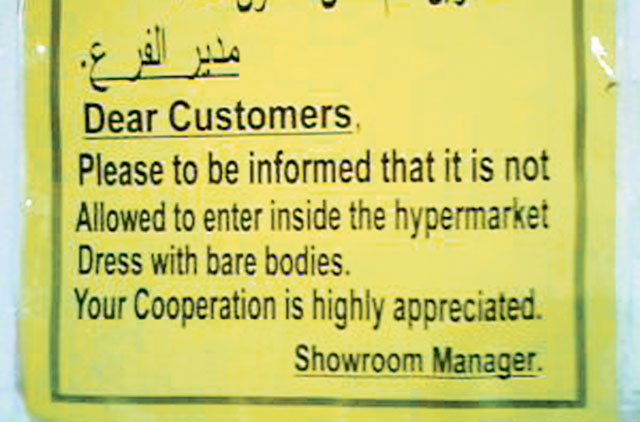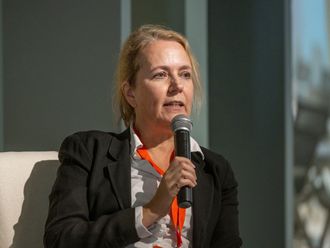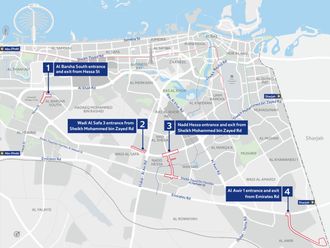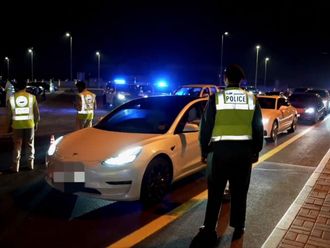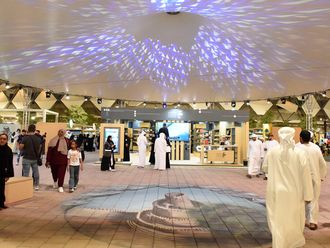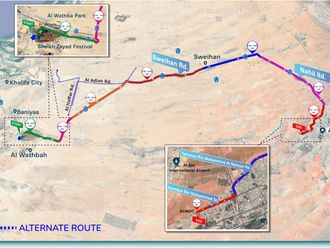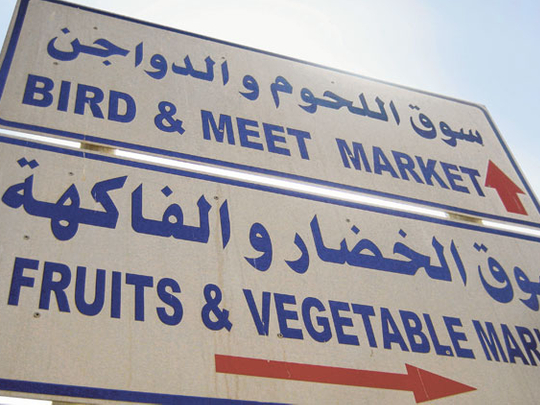
Dubai: At Al Jazeera Park in Sharjah, British tourist Elena Wilkins pointed to a notice and chuckled. "It's so funny," the 28-year-old told her travelling companions.
Her amusement was centred solely on the contents of the notice: It read: ‘Whoever Encounters Any Lost Items May Kindly Submitted To the Management. All Our Visitors Should Review The Management At Morning Time In Case Of Lost Any Thing.'
Not just tourist attractions, signs with poor English abound just about everywhere in the UAE. Roads, buildings, government departments and even important websites are riddled with misspelt words and grammar oversights.
A notice at the Union Cooperative hypermarket in Al Ghusais urges customers not to enter inside ‘Dress with bare bodies' while a message on the Dubai Police website cautions drivers to follow ‘Traffic Sins'.
Messages flashed on the Roads and Transport Authority's (RTA) intelligent system, though not fraught with the printer's devil or wrong grammar, are equally comic. "I think I know what they want to convey but there's a better way of saying it than flashing messages like ‘Beware of Other's Faults' and ‘Beware of Road Surprises'," said Indian resident Joseph Rodrigues.
Arabic is the official language in the UAE but English is the "business language." When Arabic messages are translated, word for word, the intended meaning often gets lost. The result is often unintentionally laugh-out funny. A case in point is the ‘Fishing and Getting Closer are Prohibited' warning sign at Khalid Port in Sharjah - a bewildering mish mash of two thoughts.
Classic bloopers
A British woman said try as hard as she might, she can't comprehend the meaning of ‘Knowledge Fee' charged by the RTA and Dubai General Department for Residency and Foreigners Affairs for certain services. "I asked some of my friends, but none of them seemed to have any knowledge of it," she said.
"I see ‘Parking in Backside' all the time here," said a UK businessman in Dubai, referring to signs that point to parking spaces behind buildings.
Then there are bloopers like ‘Building the Future of Dubai. We Apologise for Any Inconvenience', ‘Fresh Sweat Juice' and ‘Posturing Prohibited on the Wall'.
It's not just native English speakers who find themselves at a loss for words. A Pakistani hospitality executive, Zaki Haider, said he's bemused by ‘Close Your Mobile' signs at mosques and certain government offices.
"I once saw a poster in an Abu Dhabi residential tower: It said: ‘Dear tenants, please paid your maintenance charges to the upper date. Thanks for the information.' Never mind if the ‘upper' date was not mentioned."
Language experts, however, dismiss the insinuation that all this is leaving visitors and residents with a bad impression of the nation's standard of English.
"The UAE is like a microcosm of the state of English used in the world today. There are different types of English in use, which are equally valid," said Ian Shears, Regional Teaching Centre Manager, British Council, Dubai.
"The key point is communication. We can all make mistakes. Yes, spelling and grammar rules have to be learnt correctly. But the ‘register' - the appropriate usage for the right context - has to be suitable as well. The British Council's courses offer a communicative approach to learning English which combines both of these aspects at all levels of competency.
"People are more exposed to the diverse regional and cultural differences these days. And I think it's an enrichment of the language. English has developed according to the needs of people around the world to communicate in a variety of situations, which can be workplace, travel, entertainment or education focused. Appropriate language choices should match the appropriate situation.
"There are accents and dialects in the UK that many English people struggle to understand."
Another English specialist, Keticia Danish, agreed the UAE was a very ‘international' destination that should be allowed "room for adjustment."
"It's very natural there will be a certain amount of misunderstandings. There has to be a sense of tolerance. You can't expect everyone to be perfect all the time," said Danish, Corporate Training Manager at Eton Institute of Languages, Dubai.
Danish added: "You have to keep an open mind. Sometimes communication cannot be taken at face value; it needs a depth of understanding of culture."
Danish has taught English to dozens of nationalities, here and in China, where shop signs don't always carry an English version - and are often hard to comprehend when they do.
"It's a very soft landing as a ‘native' (English) speaker in the UAE." Still, she stressed, language should not be taken lightly, especially by large businesses. "It reflects on your professionalism and education. It's often the only thing your customer has to go by. From the first person who picks up the phone, people are judging you every step of the way."
Another expert, Rachel Stockley, told XPRESS: "If you want to attract international blue-chip companies and high-calibre professionals - and be taken seriously - you must communicate properly."
Stockley said communication blunders, particularly when they are in written form, "damages their appeal and credibility."
The specialists called for closer proof-reading of literature headed for the public domain.
"I once received a CV that read: ‘I is a proofreader and having a degree'. I replied with a polite thank you, but that went straight into the bin," Stockley said.
Online anomalies:
Traffic Sins -Typo on Dubai Police website, under a section stressing traffic signs as part of "Road Language"
Do not look like tourists at airports -Travel security advice on Dubai Police website
No need for stress, as all matters are beyond the control of anyone -Another travel tip on Dubai Police website
Traffic signs is the most important road signals that guids the driver to drive safly -Driving pointer on Sharjah Police website
Replace plastic bags with another friend of the environment- Suggestion for cutting down plastic pollution, on Ministry of Environment & Water website
Rolls and Regulations -Misprint on many occasions on Ministry of Labour website
Taking drugs or alcoholics
These should not brought to work, -says the Ministry of Labour website


